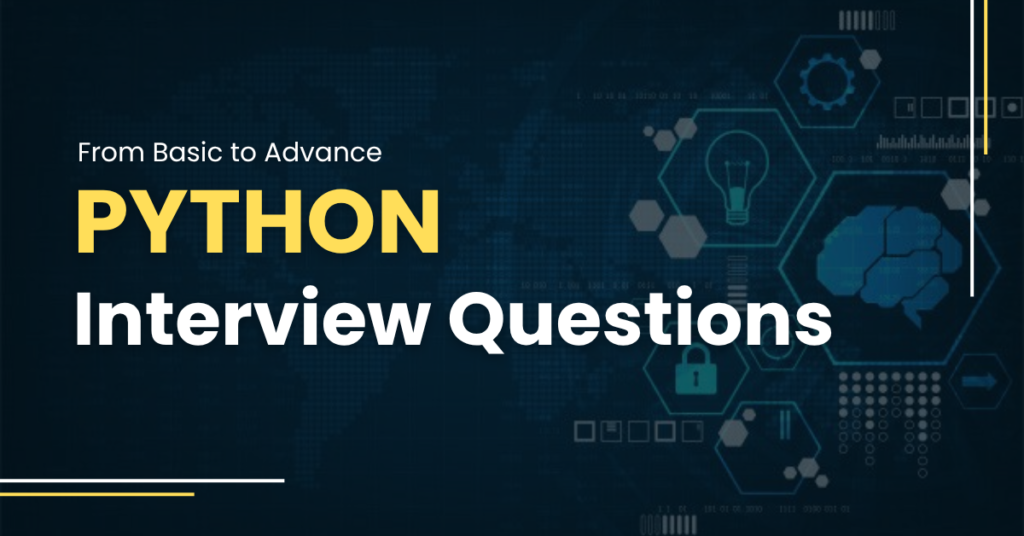Python Interview Questions with Basic to Advance Q&A PDF
Python Interview Questions
Whether you’re a budding data scientist, a fresher in programming, or an experienced developer transitioning into a Python-heavy role, one thing remains constant: interviews can be nerve-wracking. Especially when the interviewer starts throwing basic Python interview questions your way.
The problem? Most people either overcomplicate simple Python interview questions or ignore the fundamentals altogether, costing them their dream job.
This blog is designed to simplify that process for you. We’ll walk you through Python interview questions from basics to advanced, making sure you’re prepared for every level. Whether it’s understanding syntax, writing logic, or solving coding problems, we’ve explained everything in plain language.
From the most asked Python interview questions to commonly overlooked fundamentals, you’ll find real examples, straightforward answers, and tips to help you stand out. Plus, we’ve included a downloadable PDF filled with essential Python interview Questions and Answer and Python coding exercises to boost your preparation.
Watch this video before you read further:
Learn Python in 4 Hours – Full Course for Beginners | Python Tutorial by Inttrvu.ai
Top 10 Python Interview Questions with Answers
Let’s jump into Top 10 Python Interview Questions that often show up in interviews.
1. What is Python and why is it so popular?
Answer: Python is a high-level, interpreted language known for its simplicity and readability. Its popularity comes from its versatility used in web development, data analysis, AI, automation, and more.
Tip: Always relate your answer to the role you’re applying for (e.g., “In data science, Python helps with fast prototyping and data manipulation using libraries like pandas and NumPy.”)
2. What are Python’s key features?
Answer: Key features of Python:
- Python is Interpreted
- Python is Object-Oriented
- Python is Dynamically Typed
- Python has Large Standard Library
- Python is Open Source
3. What is PEP8?
Answer: PEP8 is Python’s official style guide that helps developers write readable and consistent code.
Actionable Insight: Follow PEP8 in coding assignments during interviews. It shows professionalism.
4. What are Python’s data types?
Answer: Pyhton’s data types:
- Numeric (int, float, complex)
- Text (str)
- Sequence (list, tuple, range)
- Set
- Dictionary
- Boolean
5. Explain the difference between list and tuple
Answer: Lists are mutable, while tuples are immutable.Tuples are generally faster and consume less memory than lists.
6. What are Python decorators?
Answer: Decorators allow you to modify the behavior of functions or classes without changing their code.
Actionable Insight: Write a simple decorator example before the interview and practice explaining it in 1 minute.
7. How does Python handle memory management?
Answer: Python manages memory using a private heap space that stores all objects and data structures. It employs reference counting as the primary technique to track and automatically deallocate memory when an object is no longer in use. Additionally, Python’s garbage collector identifies and clears objects involved in circular references, ensuring efficient memory usage and preventing memory leaks.
8. What are the main principles of OOPs concept in Python?
Answer: The main principles of OOPs concept in Python are:
- Inheritance
- Encapsulation
- Polymorphism
- Abstraction
9. What is the difference between class and object in Python?
Answer: The difference between class and object in Python is
- Class: Blueprint for creating objects
- Object: Instance of a class
Answer: A lambda function in Python is an anonymous, single-expression function defined using the lambda keyword. It is primarily used for short, throwaway functions that are passed as arguments to higher-order functions like map(), filter(), or sorted(). Lambda functions promote concise and readable code when defining a full function is unnecessary or excessive.
Download the PDF on Python Interview Questions along with Python Coding Questions
Conclusion: Strengthen Your Python Interview Questions and Advance Your Career
A solid grasp of Python interview questions is more than just interview preparation; it’s a reflection of your core programming and Python coding skills. Whether you’re entering the data science field or preparing for a Python developer role, mastering these fundamentals is non-negotiable.
At INTTRVU.AI, we specialize in helping professionals bridge the gap between theoretical knowledge and real-world interview readiness. Our Data Science and AI Certification Program is designed to sharpen your technical skills, boost your confidence, and prepare you for top-tier roles in the industry.
Take the next step, invest in your Interview preparation, and let your next interview be your breakthrough.
FAQs on Python Interview Questions
Common ones include data handling with pandas, NumPy operations, lambda functions, and data visualization tools like seaborn or matplotlib.
You can prefer a platform like INTTRVU.AI, Focus on Python syntax, basic coding problems, and understand core concepts like data types, loops, and functions.
Functions, data structures, file I/O, exception handling, and OOP basics.
Very important! Object-oriented skills help you write scalable, clean code in projects and pipelines.



